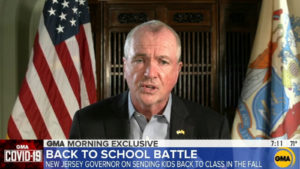Fifteen years ago the N.J. School Boards Association reported on “new challenges” to the state’s public schools. The State had introduced its Core Curriculum Content Standards (CCCS) in 1996 and, five years later, followed up with “a new state testing program” that included the ESPA, the GEPA, and HSPA.
Then-NJSBA President Patti Pawling noted that “the standards will have a strong impact on what happens in the classroom during 2000-01 and “we are already seeing high school students taking 50% more coursework in science than in past years.”
- (Flash-forward: the state introduced the Common Core State Standards in 2010 and now, five years later, is following up with a new testing program called PARCC.)
Pawling continued back in 2000,“[w]ith the curriculum standards has come a rigorous state testing program in the 4th and 5th grades, 8th grade and 11th grade. New state-developed tests depart from traditional multiple-choice standardized tests, according to the state education department. For example, students are expected to revise a letter to the editor or apply math principles to real-world scenarios.”
The article also notes that the 4th grade test, the ESPA, was considered “too long and stressful for young children” because it “was in fact longer than the SAT and even the State Bar Exam.” The D.O.E. agreed to shorten it.
- (Flash-forward: the Common Core is more “rigorous,” or at least requires more critical thinking skills and depth of knowledge. New PARCC-developed tests depart from traditional multiple-choice standardized tests because they’re computer-based. Some school districts are lessening test-stress for students by eliminating in-district assessments.)
NJSBA continues its report on new standards and assessments: “In April 2000, Commissioner of Education David Hespe called for a study into other methods beyond a state-developed paper-and-pencil test to assess student progress in the visual and performing arts, physical education and world languages. This fall, an assessment advisory panel is scheduled to report to Hespe with recommendations on the best way to test student performance in these areas. The panel consists of educators, educational organizations and representatives from the business community.”
- (Flash forward: fifteen years later, N.J. finally seems on the verge of abandoning the paper-and-pencil tests in favor of computer-based tests called PARCC, an improvement suggested by then-and-now Comm. Hespe. Unless, of course, the anti-testing crowd successfully convinces weak-kneed legislators to abandon new up-to-date assessments that rely on computers instead of pens and pencils.)
The critical difference this time, of course, is that NJEA has mounted a full-fledged assault against the new tests, not because they’re bad for children but because the union fears that they’re bad for teachers. Today NJEA’s super-PAC announced an ad campaign against PARCC that relies on a much-maligned “poll” of parents/ (For analysis of this push poll, see Peter Cunningham, Bob Braun, and me.)
Ironically, Gov. Christie, NJEA’s enemy, is currently flip-flopping on support for both Common Core and PARCC in order to woo the conservative arm of the GOP while NJEA is ardently lobbying against the same set of standards and assessments by wooing nostalgia-riven and computer-phobic parents and legislators. They all share a very short memory regarding New Jersey’s unassailiable tradition of updating student standards and assessments in order to best serve kids.



1 Comment